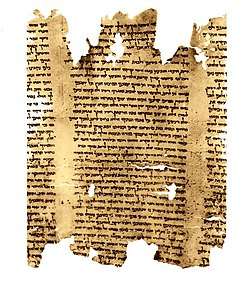Isaiah 57
Isaiah 57 is the fifty-seventh chapter of the Book of Isaiah in the Hebrew Bible or the Old Testament of the Christian Bible. This book contains the prophecies attributed to the prophet Isaiah, and is one of the Books of the Prophets. Chapter 57 is the second chapter of the final section of the Book of Isaiah, often referred to as Trito-Isaiah.[1]
| Isaiah 57 | |
|---|---|
 | |
| Book | Book of Isaiah |
| Hebrew Bible part | Nevi'im |
| Order in the Hebrew part | 5 |
| Category | Latter Prophets |
| Christian Bible part | Old Testament |
| Order in the Christian part | 23 |
Text
The original text was written in Hebrew language. This chapter is divided into 21 verses.
Textual witnesses
Some early manuscripts containing the text of this chapter in Hebrew are of the Masoretic Text tradition, which includes the Codex Cairensis (895), the Petersburg Codex of the Prophets (916), Aleppo Codex (10th century), Codex Leningradensis (1008).[2]
Fragments containing parts of this chapter were found among the Dead Sea Scrolls (3rd century BC or later):
- 1QIsaa: with all verses (1–21)
- 1QIsab: extant verses 1–4, 17–21
- 4QIsad (4Q58): extant verses 9–21
- 4QIsah (4Q62): extant verses 5–8
There is also a translation into Koine Greek known as the Septuagint, made in the last few centuries BCE. Extant ancient manuscripts of the Septuagint version include Codex Vaticanus (B; B; 4th century), Codex Sinaiticus (S; BHK: S; 4th century), Codex Alexandrinus (A; A; 5th century) and Codex Marchalianus (Q; Q; 6th century).[3]
Parashot
The parashah sections listed here are based on the Aleppo Codex.[4] Isaiah 57 is a part of the Consolations (Isaiah 40–66). {P}: open parashah; {S}: closed parashah.
- [{P} 56:10-12] 57:1-2 {S} 57:3-14 {S} 57:15-21 {P}
Verse 15
- For thus saith the high and lofty One
- that inhabiteth eternity, whose name is Holy;
- I dwell in the high and holy place,
- with him also that is of a contrite and humble spirit,
- to revive the spirit of the humble,
- and to revive the heart of the contrite ones.[5]
Verse 19
- Peace to him that is far off, and to him that is near.[7]
Peace "not only to the Jew, but also to the Gentile, as St. Paul more than once applies those terms". See Ephesians 2:13 and 2:17.
See also
- Sheol
- Related Bible parts: Isaiah 6, Isaiah 66, Ephesians 2.
References
- Oxford Reference, Overview: Bernhard Duhm accessed 6 September 2018
- Würthwein 1995, pp. 35-37.
- Würthwein 1995, pp. 73-74.
- As implemented in the Jewish Publication Society's 1917 edition of the Hebrew Bible in English.
- Isaiah 57:15
- Isaiah 57:15
- Isaiah 57:19
Bibliography
- Würthwein, Ernst (1995). The Text of the Old Testament. Translated by Rhodes, Erroll F. Grand Rapids, MI: Wm. B. Eerdmans. ISBN 0-8028-0788-7. Retrieved January 26, 2019.CS1 maint: ref=harv (link)